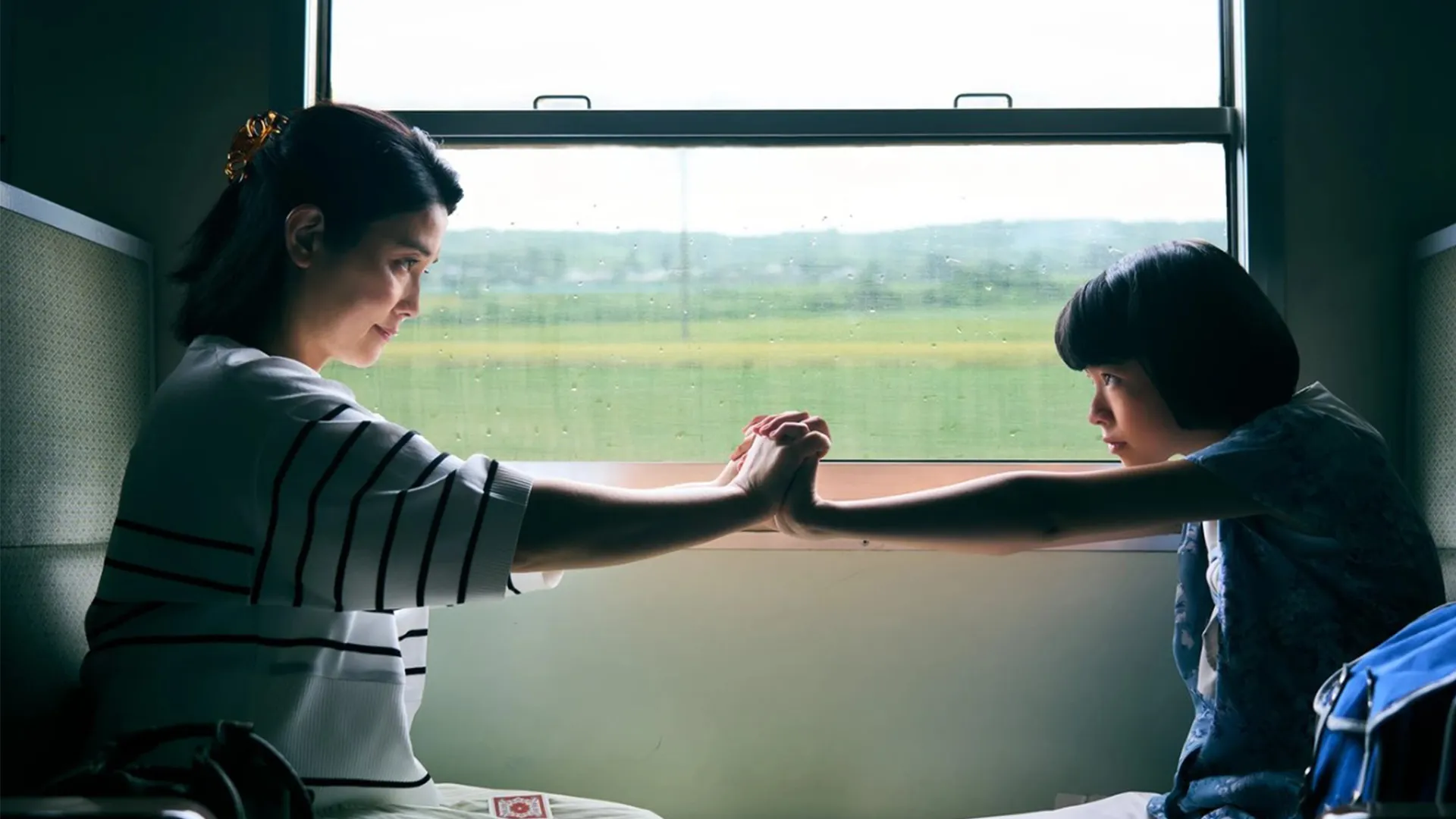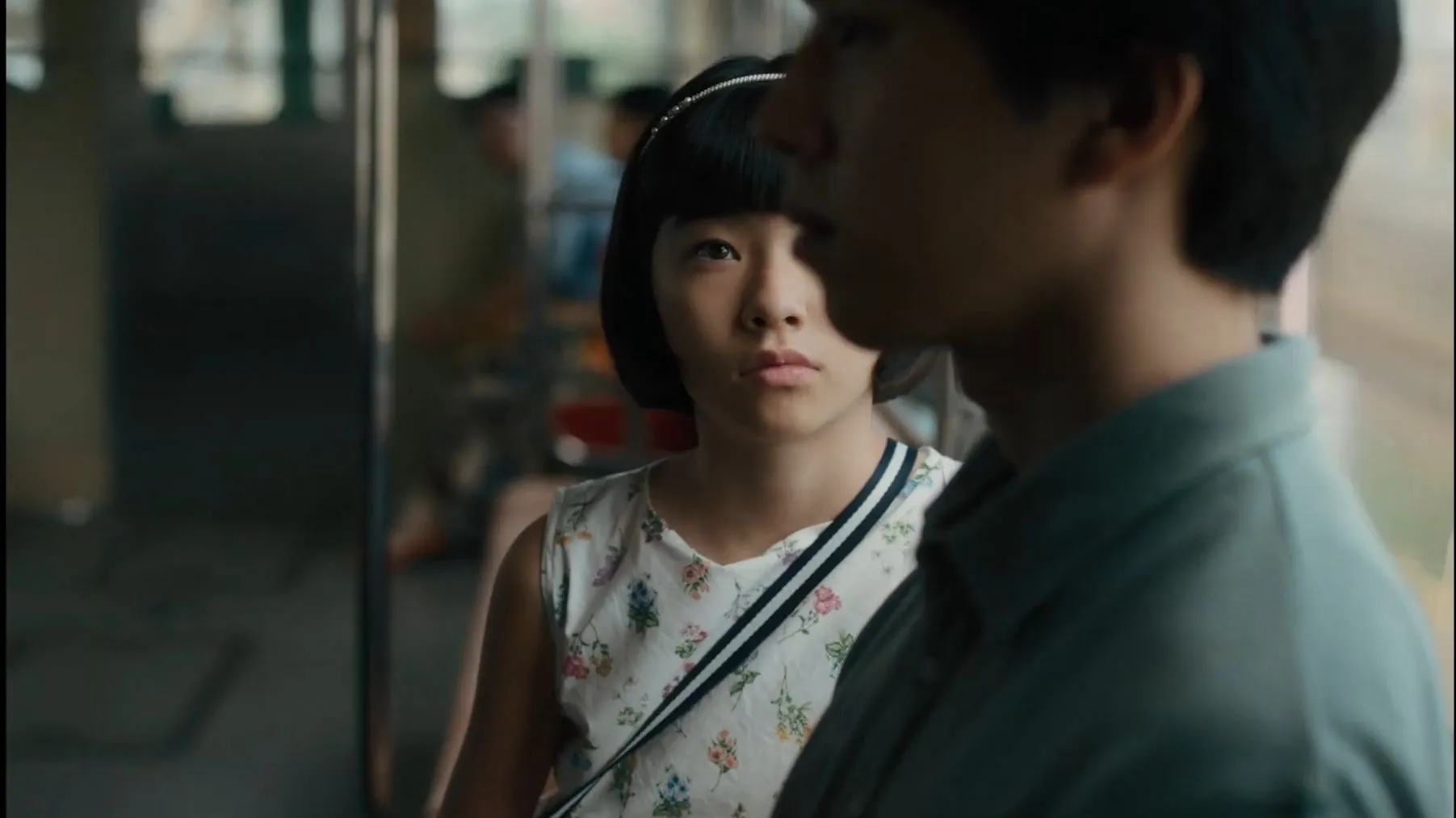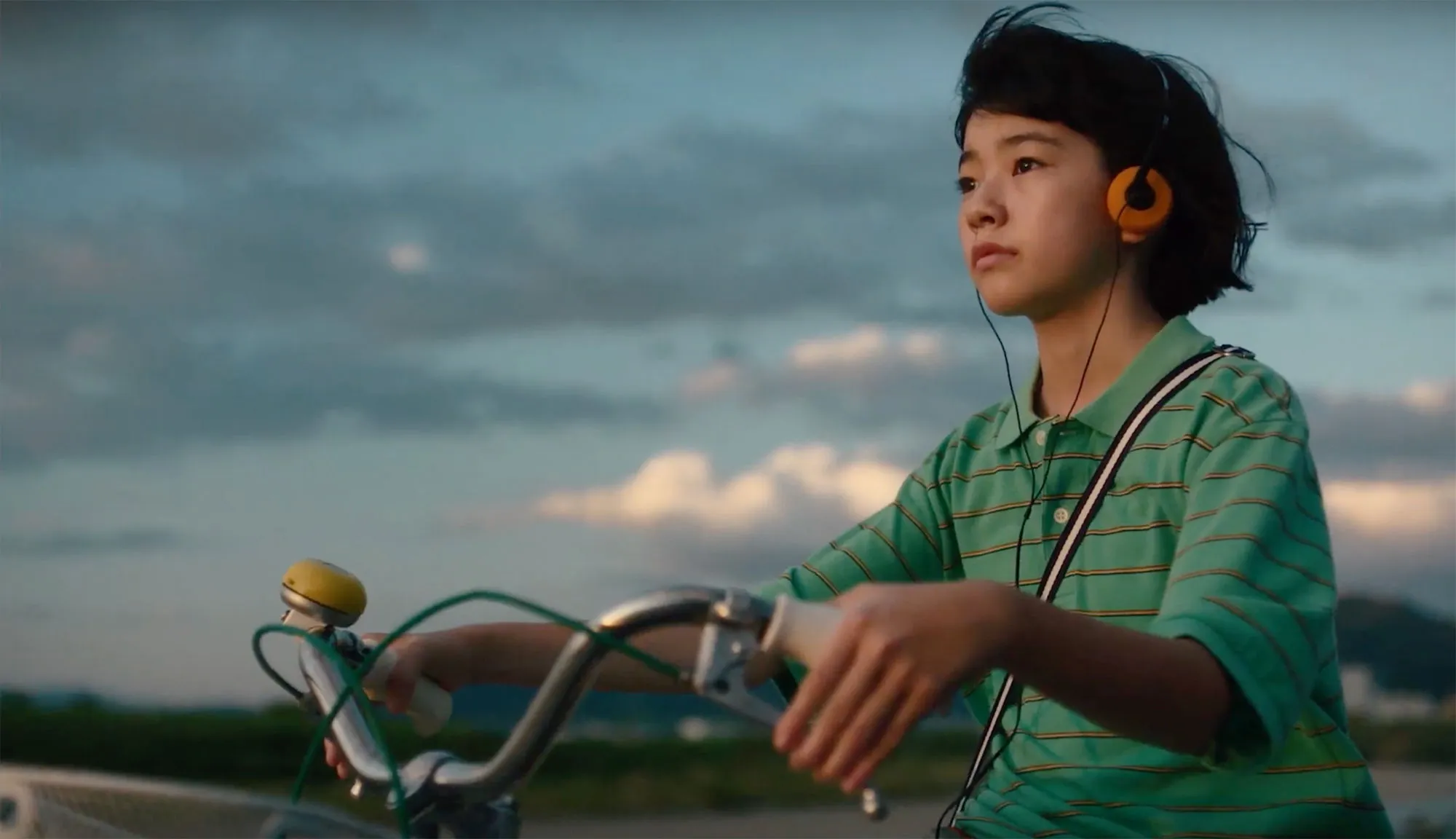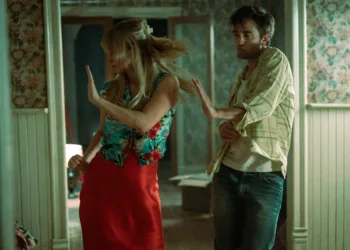In the opening sequence, young Fuki stands before a chalkboard crowded with her own words, recounting her imagined funeral as classmates squint through the dusty shafts of classroom light. The year is 1987, and suburban Tokyo hums beyond those windows—a world in the throes of economic ecstasy yet quietly unraveling in living rooms and hospital wards. Eleven-year-old Fuki, tethered to her father’s hospital bed and her mother’s absences, drifts between hospital corridors and silent streets, each step measured in equal parts wonder and apprehension.
Chie Hayakawa’s camera moves with a deliberate calm, tracing Fuki’s gaze as she tests her nascent belief in telepathy or listens to strangers’ lonely phone-dating messages echoing through midnight. Reality bleeds into her fantasies so seamlessly that the mournful daydream of her own death feels as tangible as the sterile scent of antiseptic in her father’s room.
Rather than constructing a linear tale, Renoir unfolds like a collection of memories—vignettes that wander in tone but hold fast to the gravity of a child confronting mortality. In this section, the interplay of natural light, careful pauses, and sudden jolts of unease reveals how the film inhabits Fuki’s interior world, letting us sense the tremors of grief beneath her curious exterior.
Light in the Gaps
Sunlight drifts through dusty classroom windows and hospital corridors alike, bathing Fuki’s world in a palette of muted golds and cool grays. The camera glides at her shoulder, attentive to every blink and tilt of an eleven-year-old’s gaze, catching her silhouette pressed against sunlit glass. In moments of stillness, the frame feels expansive—Tokyo’s looming apartment blocks and endless asphalt dissolve into a series of quiet, potent images that speak to a city booming while its inhabitants drift apart.
Cuts arrive without fanfare, as if assembled by Fuki’s own restless mind. One instant, she’s tracing patterns on her bedside table; the next, she’s lost in a hypnotic daydream of floating cards and whispered keys. These sudden shifts shock the senses, then settle back into languid observation. The pacing honors a child’s capricious attention, shifting gears but never jolting out of emotional range.
At night, the hiss of a telephone line and disembodied voices seeking companionship weave through the score, underscoring the film’s loneliness without a single note of melodrama. Composer Remi Boubal’s atonal motifs surface like half-remembered dreams, punctuating each scene with discreet tension. In this way, sound and image converge to sketch a world where imagination and reality exchange subtle glances, and every beam of light feels charged with possibility.
Faces in the Frame
Yui Suzuki inhabits Fuki with a wide-eyed, penetrating stare that feels at once curious and unguarded. Her performance transforms every glance into a question—whether she’s reading aloud her own funeral daydream in class or orchestrating “telepathy” rituals with classmates.
In the charged silence of the hospital corridor, Suzuki’s Fuki delivers a school essay on grief with the calm of someone who has rehearsed sorrow as a performance. Yet when she ventures into real danger via a late-night hotline, that same gaze hardens, revealing the fracture between imagination and the starkness of adult threats.
Lily Franky’s Keiji offers a counterpoint of quiet dignity: his restrained warmth surfaces in moments of vulnerability—hands trembling over a mislaid hospital phone, his voice catching as he tries to reassure Fuki. Hikari Ishida’s Utako, meanwhile, carries the weight of corporate ambition in her posture and the flicker of guilt in her eyes. When she snaps at her daughter or crumbles in exhausted tears, the character becomes a study in the silent compromises of parenthood.
Across these performances, relationships shift like chapters in Fuki’s personal mythology. Her tentative bond with an English teacher becomes a mirror for her unspoken longing; friendship with Kuriko unravels as innocence collides with the adult world; and the predatory interlude arranged by a lonely-hearts call line exposes the perilous edges of Fuki’s solitude. Each interaction scaffolds her emotional landscape, charting a young life both fragile and fiercely alive.
Echoes of Absence
Renoir confronts grief with the candor of a child and the precision of a scholar’s inquiry, asking whether tears honor the departed or console the mourner. Fuki’s whispered classrooms readings—“Do we cry because we are sorry for the person who died?
Or do we cry for ourselves?”—reverberate through every gesture and glance. The film places her confusion and guilt at the center, exposing adult indifference in Utako’s stiff professionalism and Keiji’s muted resilience. In this world, sorrow becomes a private landscape that the young girl must navigate alone.
Imagination in Renoir is both sanctuary and snare. One moment, Fuki’s magic tricks brim with innocent possibility; the next, a neighbor’s confession under hypnosis unsettles with its stark honesty. Fantasy sequences drift seamlessly into lived experience, eroding the barrier between play and peril. That unsettling blur intensifies suspense, suggesting that the most dangerous illusions are born from a child’s desperate yearning for control.
Amid Tokyo’s neon glow and booming economy, a phone-dating service becomes an elegy for social solitude. Disembodied voices seeking fleeting connection echo Fuki’s own longing, underscoring a collective loneliness masked by urban prosperity.
Her final daydream—a funeral she choreographs in the hush of a sunlit classroom—offers a tender act of empathy, a confession that in mourning others, we seek to anchor ourselves against the void. Renoir premiered at the 78th Cannes Film Festival on May 17, 2025, competing for the Palme d’Or. The film is scheduled for theatrical release in Japan on June 20, 2025.
Full Credits
Director: Chie Hayakawa
Writer: Chie Hayakawa
Producers: Eiko Mizuno-Gray, Jason Gray, Christophe Bruncher, Fran Borgia, Keisuke Konishi
Co-Producers: Jossette C. Atayde, Alemburg Ang, Olivier Père, Rémi Burah, Yulia Evina Bhara, Amerta Kusuma, Amel Lacombe
Executive Producers: Keisuke Konishi, Eiko Mizuno-Gray, Mizue Kunizane, Masahide Kinoshita, Eitaro Kobayashi, Jossette C. Atayde, Maria Sophia Atayde-Marudo, Fran Borgia
Cast: Yui Suzuki, Lily Franky, Hikari Ishida, Ayumu Nakajima, Yuumi Kawai, Ryota Bando, Hana Hope, Kotono Takanashi, Aki Nishihara, Shoichiro Tanigawa, Kyoko Miyashita, Megumi Nakamura
Director of Photography (Cinematographer): Hideho Urata
Editor: Anne Klotz
Composer: Rémi Boubal
The Review
Renoir
Renoir stands as a delicate exploration of childhood grief and imagination, blending naturalistic performances with striking visual poetics. Hayakawa captures the ache of loss through Fuki’s vivid interior life, even as the film’s loose structure occasionally drifts. The result is a haunting, intimate portrait that lingers long after the final frame, affirming Chie Hayakawa’s emergence as a filmmaker attuned to the hidden currents of emotion.
PROS
- Yui Suzuki’s performance captures Fuki’s fierce curiosity and quiet strength.
- Natural-light cinematography creates an intimate, era-specific atmosphere.
- Thoughtful sound design—phone-dating lines and atonal score—heightens emotional texture.
- Blurring of fantasy and reality underscores the film’s exploration of grief.
- Supporting cast brings depth to the family’s complex dynamics.
CONS
- Narrative can feel episodic, with loose connective tissue between vignettes.
- Pacing occasionally slows momentum, testing viewer patience.
- Some fantasy sequences risk detaching from emotional stakes.
- Secondary characters receive uneven development.
- Ambiguous structure may frustrate those seeking a conventional arc.



















































